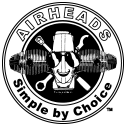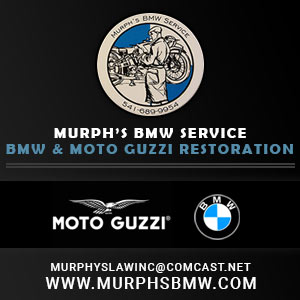Vetting of Technical Information
Back in the day when Oak was in charge of the Air Tech section of Airmail, he would answer questions by providing guidance for fixing our airhead motorcycles. For simple things most of us could perform at home, he'd advise of the needed parts, and tell us what tools to use in what order to make the repair. Then he'd make a note to himself, and that post would appear in his Air Tech Index, so other Airheads could find it when they ran into the same problem. It was a simple system that ensured that someone that knew what they were doing kept on eye on the discussion to ensure that only proper and safe techniques were published and referenced.
Oak's been gone for quite a while now, and until recently, B. Jan has been doing his best to fill Airmail with Oak's material that hadn't been published yet. But now the edict has come down from on high that the paper and e version of Airmail have to be the same. Oak left explicit terms under which he would allow his material to be used, and he expressly stated that none of it was to be made available electronically, in Airmail or anywhere else. So those same powers that be also declared that Oak's material could no longer appear in Airmail, because the electronic version would violate Oak's terms of use.
That left the editor of Airmail with the problem of how to fill up the space formerly occupied by Oak's column. The answer for the past two issues of Airmail has been to print a how-two type article written by one of the members, and formatted/reviewed by the editor. And that raises the issue that most of us airheads that wrench on our own bikes have no formal training in how BMW intended repairs to their Type 247 engined motorcycles to be repaired. So we look to those that do have that training to guide us in our work, and that expertise is no longer present in Airmail. And just because one airhead member did something to their motorcycle and somehow managed to get away with it is no guarantee either they or anyone else that follows their lead will survive the experience unscathed.
The March 2023 edition of Airmail is an example, a bad example. The author describes how he replaced the splined hub on his /5 by pounding out the rivets and installing bolts in their place. And just to be extra safe, he used Nyloc self locking nuts to ensure it didn't come apart all by itself. I'm not formally trained, but I've used Nyloc nuts before. And I know that the bolt threads need to extend all the way through the nylon locking collar to provide the locking capability. Close examination of the author's photo of the installed nuts shows that they don't extend beyond the nylon locking collar. It isn't even apparent in the photo if the ends of the bolts even reach the collar at all. The other problem is that nylon, like most plastics, softens as it warms. And the nylon locking collar would also soften as the rear hub heats up during normal use, which would also degrade the locking capability the author is depending on to keep the new splined hub in place on his wheel.
It just so happens that Tom Cutter, a widely respected individual with many years of formal training by BMW, recently described how he replaces worn hub splines on BMW wheels. BMW used steel rivets to secure the hub and wheel together, and Tom does the same to avoid the problems with nuts and bolts coming loose in use. The procedure Tom describes includes heating the rivets to red heat and them peening them using specially shaped punches, not something the average airhead would be able to do in their garage. Tom also cautions that the best way of having this repair made is to farm it out to someone that has the right knowledge and equipment to do the job right.
Now to the point of this note. The Airheads Beemer Club currently has no formal method in place to verify the technical correctness of any of the tech articles being published in Airmail, and the same can be said of any of the material in the Tech Articles section of the Airheads website. You might find waivers and cautionary notes here and there that say something about "for informational purposes only", and anyone that uses the information does so at their own risk. But that doesn't solve the basic problem that readers now have no assurance that what they're reading will fix their problem in a way that is correct and safe.
A few years ago I approached several of the better known BMW repair shops and asked if any of them would like to participate on a supervisory committee that would review technical content on both the Airmail and on the airheads website. To a person, all of them said they were way too busy working on bikes to devote the time needed to perform such a function. Some of them also said that by providing such guidance, they'd be giving away trade secretes that would cost them some of their business. Still others were afraid that the text of a reviewed article would be inappropriately revised during the publication process, and that the resulting bad information would reflect badly on anyone that participated in the review process. And that could result in ugly lawsuits. So at this point, I really don't have a solution to this problem, other than to reinforce the idea that people should take what they read with a rather large grain of salt, and before they try any of the techniques depicted in the magazine or on the website, they think twice about what would happen should the repair go bad, or where they might choose to have someone with the proper training and tools do the work instead.
That said, if anyone reading these words does have factory training and experience, and would be willing to serve on an oversight committee, I'd like to discuss the idea of forming such a committee with you. Such a capability would be unique among the many sources of airhead knowledge available today, and would be a tremendous asset to the members of the Airheads Beemer Club.
It's a very tough situation. Finding a good 'wordsmith' and knowledgeable mechanic in the same person is a rarity. It's not a common skill mix. And then, those few who have it may be thinking about a book or other sellable media that can enhance their income... and who can blame them. Knowledge and expertise is a saleable commodity.
And you almost need someone currently practicing. Techniques, tools and compounds that BMW approved in 1975 may no longer be valid. There was no issue with gasoline up to 1990; whereas it's one of your biggest owner storage issues today. Synthetic oils and greases are far superior to what your old owner's manual recommended back then. Tire sizes are all metric now. And because of them, listed tire pressures are up by 10-15%. The list goes on, but you get the idea. I haven't turned a wrench in 3 years, and even I feel "out of date". It's a situation that's common to all classic vehicle clubs.
Owning an old Airhead is easy.
Keeping an old Airhead running great is the true test.
This is a very good point. I noticed the nyloc nuts as well. I think either Oak, or more likely Snowbum had a “nut and bolt” solution to this, but it was using very specific (aircraft?) fasteners - not anything from the local hardware store. Even then, riveting was the preferred recommendation, of course.
My knowledge is very limited, but enough to recognize many cases of poor/wrong/misleading guidance being given on various Airhead Facebook pages. All is well intended, but coming from untrained folks, it’s what happens. Without expert vetting, that same situation is going to bleed over to our printed pages as well. Hmmm.
I'm an aircraft mechanic and retired mechanical engineer. Aircraft rivets are set using a rivet gun and a bucking bar. None of the aluminum rivets we set in A&P school required heating. Indeed, heating the rivet would change its mechanical properties (e.g. ductility, shear strength, etc). Maybe steel rivets used in the Airhead rear wheel hub are different?
Nylock nuts are never used where they're subjected to heat which woud melt the thread-locking material. The photo on page 23 in March Airmail shows Nylock nuts which are NOT properly installed as you have indicated.
Grade 8 bolts are stronger than grade 5 bots. Grade 8 bolts have 6 raised lines oriented radially on the bolt head. Grade 5 bolts have three raised lines. Bolts with no raised lines are even weaker than grade 5.
'Factory trained' Airhead techs are going the way of the dinosaur, and we may as well get used to pressing on with what we have of shop manuals and other printed tech info which, between Oak and Snowbum, just about covers everything. Perhaps if Oak had lived a bit longer, he may have realized the benefits of archiving on the internet, but that's water under the bridge at this point.
IMHO, anyone with general mechanical experience, aptitude, and access to a shop manual can do just about any maintenance needed on an Airhead, but may sometimes need to access or fab special tools. In addition to Airheads, I am a Studebaker aficionado, and have driven about a dozen of them (1956-1965 vintage), collectively, over 700,000 miles since the mid-1980s. I do all my own maintenance and, excepting machine shop tasks, there isn't much I have not done to them: engine rebuilds, transmissions, rear ends, steering gearboxes, suspensions etc.. I have also been a tech advisor for a specific 1956 model Stude (Golden Hawk) since the 1990s. With vintage vehicles of any kind, it's often helpful to think out of the box, and work with what's now available. Then too, many things have improved over the years, i.e. synthetic lubricants, which also benefit our Airheads. For some old timers, resistance to change some is a hindrance, i.e. many Stude folk still insist on putting GL-1 gear oil in their transmission gearboxes, and ATF on their power steering systems. So instead of lamenting about days (and people) gone by, I prefer to press on, and just work with what I have, or can access when needed. If someone submits a well meaning tech article to Airmail, I'll be thankful, but also will take what's for me and leave the rest. I find Airhead technology about same as Studebaker's and farm implements, and do not foresee any problems keeping my current 95 R100RT on the road, till I can no longer ride. But at 70 years old, I realize that may only be another 20 years or so. LOL
- 27 Forums
- 1,952 Topics
- 11.1 K Posts
- 16 Online
- 11.9 K Members



